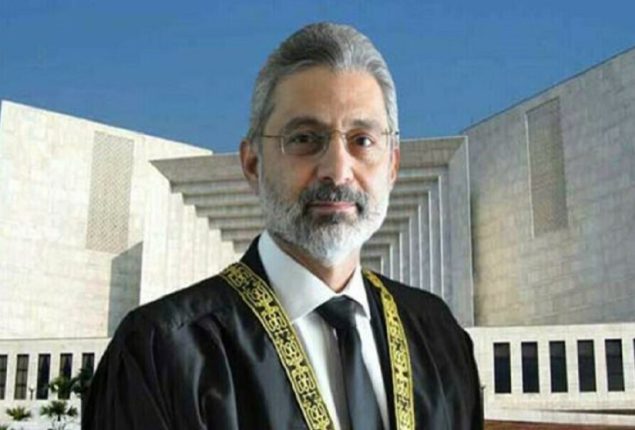PTI moves SC against PHC’s verdict on bat symbol
PTI said application of ECP was not admissible. Petitioner said ECP cannot...

Why Saadiq and Ameen conditions not imposed on dictators, asks CJP
ISLAMABAD: The Supreme Court (SC) resumed its hearing on a case regarding the lifetime disqualification of lawmakers under Article 62(1)(f) of the Constitution.
A seven-member bench, led by CJP Isa and including Justices Syed Mansoor Ali Shah, Yahya Afridi, Aminuddin Khan, Jamal Khan Mandokhel, Muhammad Ali Mazhar, and Musarrat Hilali, is currently overseeing the proceedings. The case is being broadcast live on the SC’s website and YouTube channel.
During the recent session after a day’s recess, Khurram Raza, the lawyer representing plaintiff Sajjadul Hassan, raised a query about the legal basis for hearing appeals. He questioned whether the appeals were being heard under Section 184-3 or 187 of the Pakistani Constitution. CJP Qazi Faez Isa responded by urging Raza to present his case without unnecessary repetition.
CJP Isa then raised a crucial question about whether the SC possesses the authority under Article 62-1F to impose lifetime disqualification. He pointed out that a candidate is typically disqualified over issues related to nomination papers and questioned the rationale behind a lifetime disqualification.
The Chief Justice expressed his concerns about the historical context, noting that dictators had amended the constitution by imposing conditions of Saadiq and Ameen for parliamentarians. He questioned why similar conditions were not imposed on dictators when contesting elections, emphasizing that the criteria for lifetime disqualification were determined subjectively, not constitutionally.
CJP Isa also highlighted the questionable process of amending disqualification provisions in the Constitution, stating that amendments were made under duress. He questioned the wisdom of a court’s decision superseding that of the elected Parliament, asserting that dictators come to power by violating the constitution, not through democratic elections.
Justice Mansoor Ali Shah questioned the validity of lifetime disqualification when the Election Act had been amended by the Parliament. Advocate Usman Karim argued that the conditions of Saadiq and Ameen were not exclusive to Islam, as they also applied to non-Muslims. He opposed the 5-year disqualification of lawmakers as per the Election Amendment Act.
During the last hearing on January 2, Attorney General of Pakistan Mansoor Usman Awan urged the bench to reconsider its decision on lifetime disqualification. CJP Isa questioned whether the amended Election Act 2017 or the SC’s verdict on lifetime disqualification should take precedence.
The AGP supported the Election Act 2017, but maintained that lifetime disqualification would persist unless the SC’s verdict changed. The court deliberated on the possibility of amending the Constitution through legislation and questioned the necessity of a constitutional amendment.
To provide context, in 2018, a five-judge SC bench unanimously ruled that disqualification under Article 62(1)(f) is a lifetime penalty. This article requires parliamentarians to be ‘sadiq and ameen.’ The decision, initially applied to figures like Nawaz Sharif, led to subsequent amendments limiting disqualification to five years in the Elections Act 2017. The ongoing hearing grapples with the conflict between the amended law and the SC’s earlier ruling on lifetime disqualification.
Catch all the Pakistan News, Breaking News Event and Latest News Updates on The BOL News
Download The BOL News App to get the Daily News Update & Follow us on Google News.